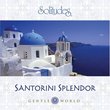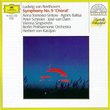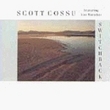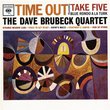| All Artists: Pomerium, Blachly Title: Musical Book of Hours Members Wishing: 0 Total Copies: 0 Label: Archiv Produktion Release Date: 4/14/1998 Genres: Special Interest, Pop, Classical Styles: Vocal Pop, Opera & Classical Vocal, Forms & Genres, Rondos, Historical Periods, Early Music Number of Discs: 1 SwapaCD Credits: 1 UPC: 028945758626 |
Search - Pomerium, Blachly :: Musical Book of Hours
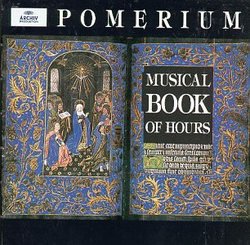 | Pomerium, Blachly Musical Book of Hours Genres: Special Interest, Pop, Classical
This is one of the most beautiful early music discs in the catalog--equally attributable to the music and to the perfectly tuned and blended voices, whose timbres couldn't be more appealing to the ear or more appropriate... more » |
Larger Image |
CD DetailsSynopsis
Amazon.com This is one of the most beautiful early music discs in the catalog--equally attributable to the music and to the perfectly tuned and blended voices, whose timbres couldn't be more appealing to the ear or more appropriate to the style of the repertoire. The very first track--a charming, gentle, hopeful little piece by Dufay, "Bon jour, bon mois, bon an"--leads us easily into the heart and spirit of this well-conceived program, which seeks to duplicate in music the expressive power and visual beauty of the richly illustrated Books of Hours--lovingly created volumes that were a cherished fixture of religious devotional practice in medieval and Renaissance Europe. Among the composers represented are Dufay, Desprez, Busnoys, Dunstaple, and Ockeghem. Put this at the top of your list. --David Vernier Similarly Requested CDs
|
CD ReviewsA must! 12/28/1998 (5 out of 5 stars) "Each new Pomerium CD becomes an essential part of my library. Most of the works were new to my ear (includes a setting by Josquin of the opening of St. John's Gospel). Alexander Blachley -- keep the CD's coming!" Become immersed in medieval piety Boileau0663 | Tournai, Belgique | 01/11/2004 (5 out of 5 stars) "Until I read the richly illustrated booklet that accompanies this cd, I thought I knew, from what I had read here and there in history textbooks, what a medieval "book of hours" is: the equivalent of our modern-day comic strips, a book to kill dreary hours when tv did not yet exist. Little did I suspect that the "hours" in question are the hallowed times during the day (seven in all) when monks get together in the church to sing psalms and pray God in harmony with the progression of the sun. What the book of hours did was to bring the daily liturgy of the convent into the life of the laity, adding a rich ornamentation and all kinds of details related to the calendar.In these devotional exercises prayers to and meditions on the Blessed Virgin were prominent. The content of a typical medieval book of hours, which, as you can see, has nothing to do with casual reading, serves as the structure of this album of sublime late medieval sacred chants: just as a book of hours begins with a depiction of the seasons, a joyous song evoking the calendar by Dufay opens the performance. It is followed by a long, stately Gospel lesson (the first chapter of the Gospel of John:"In the beginning was the word...") by Josquin Desprez. Thereafter, as so many beads on a musical string, a succession of hymns to the Virgin Mary( which make up more than a third of the recording). Then the choristers pay homage to the Holy Cross and the Holy Spirit, supplicate the saints, before singing a vibrant piece from the Office of the Dead "De Profundis Clamavi", also by Desprez, which ends the performance. This cd is exceptionally beautiful on account of several factors:-perfect balance between male and female voices: too many Renaissance music recordings suffer from a kind of yin/yang imbalance in which the sopranos "outvoice" their male counterparts, giving us a music that is often too high and ear-fraying.-ideal track length: again many acclaimed recordings are characterized by an (over)abundance of very short tracks, mostly two or three minutes songs or motets. In this album the average track length is much higher, with two 9 minutes and one 12 minutes pieces.This means that you have enough time to get completely immersed in the mood of each chant.-greater calm and intimacy: many Renaissance albums tire the listener through an excess of what I call "triumphant" chants: music with great vocal surges and swells during which all choristers sing at the top of their voices (Spem in alium by Tallis or the Requiem Mass by Victoria are typical examples). This performance bathes in a more quiet and intimate atmosphere, as befits a private liturgy in honor of tender Mary. Besides, a kind of "grounding" effect that is very soothing is obtained through the Gregorian chant pieces sung only by male voices (there are two of them on this album).What else could I say than to recommend you this magnificent cd? It is really a pity that all other recordings by this chorale, the New-York based Pomerium("orchard" in Latin), are out of stock. Anyway, the Book of Hours is such a splendor that we can still consider ourselves blessed a thousand times." Splendor G. Calderone | 05/09/2003 (5 out of 5 stars) "One of my favorite CDs of medieval/renaissance choral music. Light some candles and/or incense, turn off the lights and drift heavenward. The Salve Regina is the best!"
|

 Track Listings (12) - Disc #1
Track Listings (12) - Disc #1
